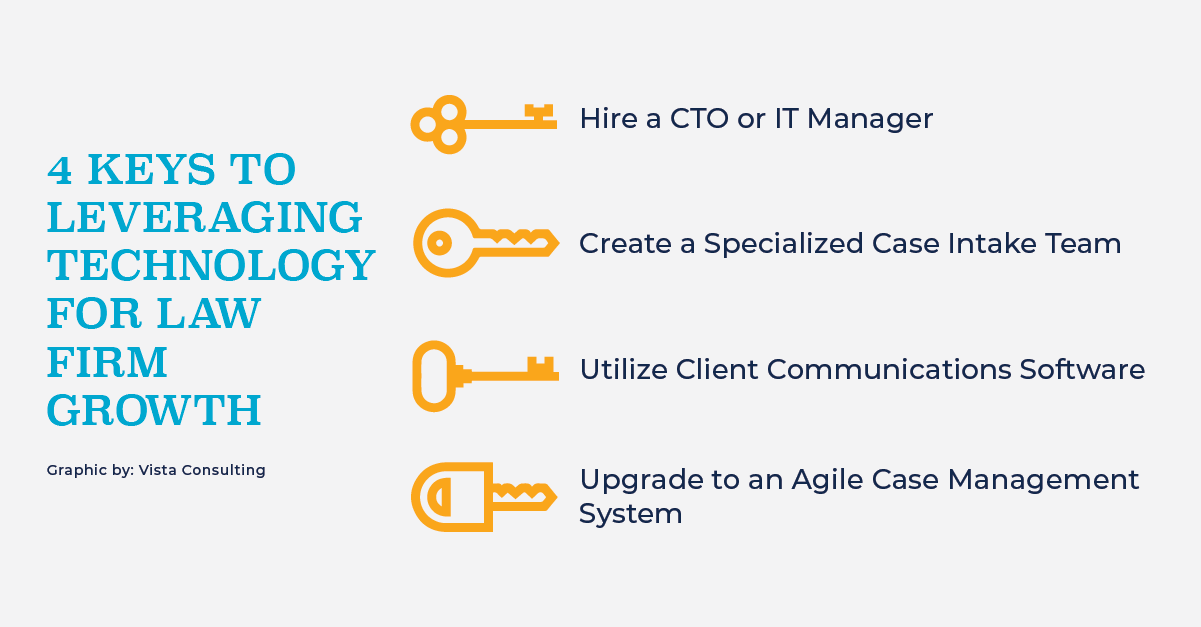
Technology
4 Keys to Leveraging Technology for Law Firm Growth

In this blog, we feature insights into the four keys for leveraging technology for law firm growth.
To be competitive in today’s legal landscape, contingency fee law firms should consider financing for law firm growth.
Smart law firms understand the importance of a focused technology roadmap that includes four key areas of investment:
- Talent: Hiring a dedicated CTO or IT manager
- Case Intake: Creating a specialized case intake team
- Customer Service: Utilizing client communications Software
- Case Management: Upgrading to an agile Case Management System
#1 – Hiring a Dedicated CTO or IT Manager
Investing in technology not only helps a firm become more efficient and effective in settling cases, but it allows the firm’s attorneys to concentrate on actually practicing law instead of getting bogged down by client intake and client communications.
The most effective ways a firm can streamline investments in technology is to hire a CTO or IT manager, taking the responsibility off of the firm’s partners. A Chief Technology Officer (CTO) can implement innovative tech solutions to improve operational efficiency, client communication and recommendations, financial forecasting, and data gathering and analysis to give insight into the firm’s business health.
Investing in a CTO and the subsequent technologies they will implement requires capital. For many self-financed law firms, liquidity is hard to come by as most of their cash is tied up in case costs. One of the quickest and most effective ways to access capital for investment in technology is financing case costs through a Case Cost Line of Credit, which frees up the firm’s cash that was previously locked up in case expenses.
Keeping up with the latest trends in legal tech, upgrading software systems, purchasing new computers and phone systems, or engaging a security service to protect your firm from cyber-attacks are all essential tech which can fuel business growth.
Grewal Law — a family-owned and operated Michigan-based mass tort, personal injury, and medical malpractice firm — hired a Chief Operations Officer to manage business operations and technology. For Nolan Erickson, Chief Operating Officer at Grewal Law, “It’s been very important to me that our firm keep up with the advances in legal technology and remain competitive and as much ahead of the curve as possible. Working with Esquire Bank has allowed us to embrace those new technologies and bring new solutions to our clients and pursue those claims and solve its problems in a way that we just couldn’t do before.”
#2 – Creating a Specialized Case Intake Team
One of the most important functions for a law firm is its case intake process . Investing in this area of technology is crucial for effective law firm growth and improving conversion rate. The ROI of a well-trained case intake team accompanied by great intake tech and procedures could easily outweigh the cost of investment.
Atlas Consumer Law, headquartered in Michigan, did just that by building the Atlas Help Center. While many firms outsource this function, Ahmad Sulaiman — Managing Partner at Atlas Consumer Law, realized building this operation and technology in-house would enable the firm to significantly increase its caseload and conversion rate.
The firm’s call center is capable of handling 500 to 700 active federal litigation cases nationwide at any given time. According to Sulaiman, “Being able to capitalize on the rise in consumer cases was really based entirely upon our ability to create a call center.”
#3 – Utilizing Client Communications Software
Contingency law firm owners are often juggling their own cases while also running the firm’s business operations. Keeping in touch with every client, making sure they’re updated on their case in a timely manner, fielding clients’ ad-hoc questions and needs to ensure client satisfaction can often be overwhelming.
While running her own contingency fee practice, Lauren Sturdivant, co-founder and president of client connection and marketing platform Case Status, felt like she was drowning in her efforts to keep up with clients’ questions. Frustrated with the time-consuming effort of replying to client phone calls, texts, and emails at all hours of the day, she looked to tech to ease her load and improve client service for clients involved in high-stress cases.
Your firm most likely has case management software in place, but does it allow your attorneys and clients to communicate through a dedicated app which logs all communication, remind clients of important meetings and dates, send clients automatic updates on typical case milestones, or track client’s medical visits and test results? If your case management system hasn’t been updated in the last three to five years, you may be missing out on functionalities that your competitors are using to pull ahead.
Streamlining common client communications such as court dates, documentation requests, deadlines, etc., frees up time for your attorneys to actually work on resolving a case. With minimal effort from attorneys, a great communications system that consistently updates clients on their case status in a timely manner, while they’re going through what is ostensibly the hardest time in their life, can ease unnecessary stress and improve client satisfaction.
Firms that don’t have the cash to invest in great client communications software should consider getting a Working Capital Line of Credit. Investing in this technology can lead to clients feeling well taken care of, allowing them to have easy access to their attorney and case status while leaving the attorney free to focus on resolving cases. Although it may seem that this channel of communication is less personal, it actually allows attorneys to prioritize in-person calls or meetings for especially crucial points of a case.
In today’s reviews-focused digital landscape, positive client experiences can lead to positive Google reviews which in turn impact a potential client’s decision to engage your firm for their own cases. Thus, an effective client communications system not only improves client service, but can also grow client acquisition.
#4 Upgrading to an Agile Case Management System
While every law firm has some sort of case management software (CMS) in place already, investing in an upgraded CMS that is the right fit for the firm could yield greater revenue by enabling faster resolution of cases and increased client satisfaction.
The failing of most case management software is that they do not track if a client’s message was returned, the timeliness of the response, or the client’s sentiment at each stage of their case. The right case management system includes client communications capabilities such as automated responses for common case stages, logging of all client communications agnostic of the channel (text, email, voice call, in-person meetings, etc.), reminders of key dates, requests for important documentation and tracking the completion of such documentation, and many other functionalities that can be pre-programmed to relieve an attorney from manual management.
Investing in a proper CMS can also provide law firm owners with key data points that give insight into their business health: tracking efficiency and effectiveness by attorney, cost per lead, conversion rate, and much more.
For effective law firm management, Gary Falkowitz, president of Intake Conversion Experts, recommends law firm owners know two key data points:
- Cost per Lead: cost to the firm for each lead on a qualified case (a case that the firm is actually interested in engaging)
- Conversion Rate: how many clients does the firm actually engage vs. the number of potential clients the firm is currently fielding
Most firms have no clue how to calculate their conversion rate which can lead to misguided business strategies. It’s important to understand your conversion rate in order to pinpoint the typical client profile and case qualities which are most profitable for your business.
According to Falkowitz, “On average, personal injury firms nationwide leave one-quarter of qualified cases on the table.”
A robust case management system with effective client communication software along with a well-designed client intake process will prevent potentially lucrative clients from slipping through the cracks.
Leveraging case cost financing to free up capital and improve liquidity
With a dedicated financing such as a Case Cost Line of Credit, Working Capital Line of Credit, or Case Acquisition Line of Credit, you can free up cash that was once locked up in case expenses to invest in upgrading your firm’s tech stack.
Whether choosing to implement a new technology, it’s important to consider how the software will grow with your firm over the next three to five years, not just whether it will fulfil your firm’s current needs. The technology should not only improve the efficiency of your teams, but also improve their effectiveness by allowing each team member to focus on the work they’ve specialized in.
When choosing a financial partner to finance investments in technology for law firm growth, it’s important for contingency fee firms to consider if the partner has the expertise to value a firm’s case inventory and the authority to lend against it. Though many commercial banks may offer a contingency firm small business loans, they will often require the firm’s partners to use their personal assets as collateral. This can often hamper the partners’ ability to make significant changes in their personal finances.
Founded by trial lawyers, Esquire Bank has the unique expertise to value a contingency fee law firm’s case inventory, the authority to use it as collateral to lend against, and the deep understanding of the business model to provide flexible, tailored solutions for each firm.
Now that you know more about the 4 Keys to Leveraging Technology for Law Firm Growth, click to read our comprehensive discussion about the 4 key considerations for law firm growth and succession planning.
Meet with an Esquire Bank
Set up a time convenient to your schedule to talk meet with an Esquire Bank Business Development Officer to discuss your law firm’s growth assessment, your firm’s needs, and how you can leverage the value of your contingent case inventory with Esquire Bank’s case cost financing.
For more on Esquire Bank’s expertise in spurring growth for law firms, please see our resources portal, Lawyer IQ, where there are resources on growing your business, financing for law firms, marketing strategy best practices, and more.
You can also register to receive the Insights newsletter for more in-depth interviews with legal industry professionals, case studies, and resources.
Download the “Typical Lending Options for Contingency Fee Law Firms” Infographic
To learn about the “Typical Lending Options for Contingency Fee Law Firms”, click below to download
* The information provided on (or accessed through) this email is provided for general informational purposes only and is not intended as, and should not be relied on for, law firm operations, tax, legal or accounting advice. Some of the information may not be applicable or appropriate for all law firms. Please consult your own tax, legal and accounting advisors as appropriate.
Continue Reading
- Life Cycle Stage: Educated - Best Practices
- Content Tier: platinum
- Content Type: blog
You are now leaving Esquire Bank
https://lawyeriq.esquirebank.com





